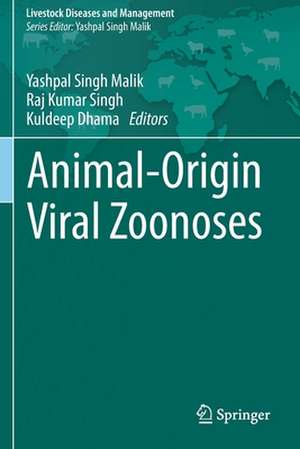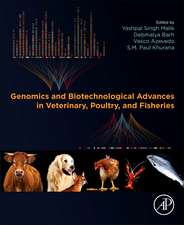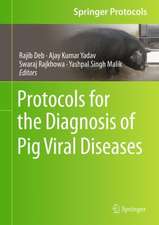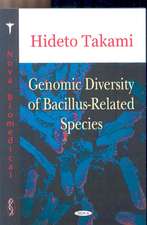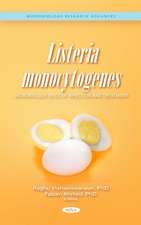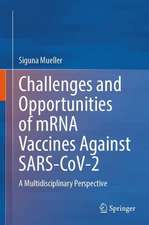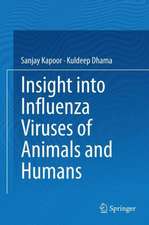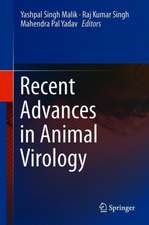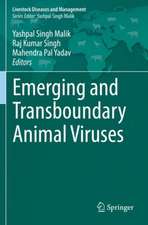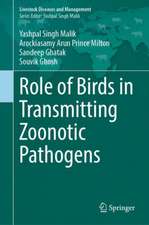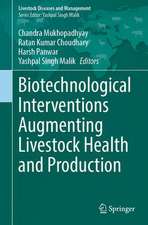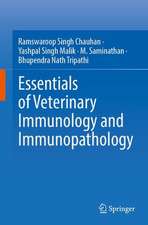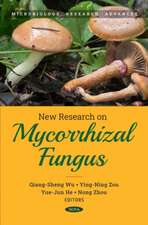Animal-Origin Viral Zoonoses: Livestock Diseases and Management
Editat de Yashpal Singh Malik, Raj Kumar Singh, Kuldeep Dhamaen Limba Engleză Paperback – 25 sep 2021
This book is the second volume in the series Livestock Diseases and Management, and reviews the importance and implications of animal origin viral zoonoses. It also highlights the specific etiology and epidemiology of these viral infections and discusses their various biological and mechanical transmission mechanisms. Further, the book reviews various measures for controlling viral zoonoses and examines novel therapeutic and prophylactic strategies.
Discussing recent studies on the pathogenesis and host immune response to these infections, it underscores the importance of using vaccines against these viral diseases to reduce the risk of them being transmitted to humans.
Lastly, it describes in detail the challenges posed by these viral infections and our readiness to face them.
| Toate formatele și edițiile | Preț | Express |
|---|---|---|
| Paperback (1) | 1112.60 lei 6-8 săpt. | |
| Springer Nature Singapore – 25 sep 2021 | 1112.60 lei 6-8 săpt. | |
| Hardback (1) | 1118.75 lei 6-8 săpt. | |
| Springer Nature Singapore – 24 sep 2020 | 1118.75 lei 6-8 săpt. |
Preț: 1112.60 lei
Preț vechi: 1356.83 lei
-18% Nou
Puncte Express: 1669
Preț estimativ în valută:
212.89€ • 222.88$ • 176.16£
212.89€ • 222.88$ • 176.16£
Carte tipărită la comandă
Livrare economică 05-19 aprilie
Preluare comenzi: 021 569.72.76
Specificații
ISBN-13: 9789811526534
ISBN-10: 9811526532
Ilustrații: XV, 378 p. 57 illus., 49 illus. in color.
Dimensiuni: 155 x 235 mm
Greutate: 0.55 kg
Ediția:1st ed. 2020
Editura: Springer Nature Singapore
Colecția Springer
Seria Livestock Diseases and Management
Locul publicării:Singapore, Singapore
ISBN-10: 9811526532
Ilustrații: XV, 378 p. 57 illus., 49 illus. in color.
Dimensiuni: 155 x 235 mm
Greutate: 0.55 kg
Ediția:1st ed. 2020
Editura: Springer Nature Singapore
Colecția Springer
Seria Livestock Diseases and Management
Locul publicării:Singapore, Singapore
Cuprins
Chapter 1. Rabies virus.- Chapter 2. Monkeypox virus.- Chapter 3. Nipah virus.- Chapter 4. Animal Caliciviruses.- Chapter 5. Avian Influenza.- Chapter 6. Swine Influenza virus.- Chapter 7. Buffalopox virus.- Chapter 8. Animal Rotavirus.- Chapter 9. Capripoxvirus and Orf virus.- Chapter 10. Hepatitis E viruses.- Chapter 11. MERS-CoV.- Chapter 12. Japanese encephalitis virus.- Chapter 13. Picobirnavirus.- Chapter 14. Drivers of Emerging Viral Zoonoses.- Chapter 15. Viral zoonoses: wildlife perspectives.
Notă biografică
Dr. Yashpal Singh Malik is an “ICAR National Fellow” at the ICAR-Indian Veterinary Research Institute, Izatnagar, India, where he is working on viral disease epidemiology, virus-host interactions, microbial biodiversity, and the characterization and diagnosis of pathogens. He pursued advanced studies in molecular virology at the University of Minnesota, USA; University of Ottawa, Ontario, Canada; and Wuhan Institute of Virology, Wuhan, China. He is the recipient of several prestigious national, state and academy awards and honors, including the ICAR-Jawaharlal Nehru Award. He has authored 5 books, 25 book chapters, and over 200 research and review articles. Dr. Malik is Editor-in-Chief of the Journal of Immunology Immunopathology and has also edited special issues of the Springer journal VirusDisease, Bentham’s The Open Virology Journal, and the Journal of Current Drug Metabolism.
Dr. RajKumar Singh is currently Director-cum-Vice-Chancellor of the ICAR-IndianVeterinary Research Institute, Izatnagar, India. He is a respected scientist specializing in veterinary microbiology, biotechnology, molecular epidemiology, diagnostics and vaccinology. Dr. Singh has served as Head of the Division of Virology, Station-In-Charge at the IVRI, Mukteswar Campus, Uttarakhand and later as Director of the NRC on Equines and VTCC, Hisar. He holds 10 national patents (2 granted & 8 filed), and has developed 8 live attenuated vaccines/vaccine candidates and 26 diagnostic tests/assays/kits. He has authored 2 books, 23 book chapters and over 200 research papers. He has received several awards, including the prestigious ICAR Rafi Ahmad Kidwai Award and Team Research Award, the DBT Tata Innovation Fellowship Award, and the Agriculture Research Leadership Award. He was also awarded an FAO Fellowship at the University of California Davis, USA. He is currently President of the ISVIB, and is a fellow or life member of various professional societies.
Dr. RajKumar Singh is currently Director-cum-Vice-Chancellor of the ICAR-IndianVeterinary Research Institute, Izatnagar, India. He is a respected scientist specializing in veterinary microbiology, biotechnology, molecular epidemiology, diagnostics and vaccinology. Dr. Singh has served as Head of the Division of Virology, Station-In-Charge at the IVRI, Mukteswar Campus, Uttarakhand and later as Director of the NRC on Equines and VTCC, Hisar. He holds 10 national patents (2 granted & 8 filed), and has developed 8 live attenuated vaccines/vaccine candidates and 26 diagnostic tests/assays/kits. He has authored 2 books, 23 book chapters and over 200 research papers. He has received several awards, including the prestigious ICAR Rafi Ahmad Kidwai Award and Team Research Award, the DBT Tata Innovation Fellowship Award, and the Agriculture Research Leadership Award. He was also awarded an FAO Fellowship at the University of California Davis, USA. He is currently President of the ISVIB, and is a fellow or life member of various professional societies.
Dr. Kuldeep Dhama, M.V.Sc., Ph.D. (Gold Medalist) is working as Principal Scientist in Division of Pathology at ICAR-Indian Veterinary Research Institute, Izatnagar, Uttar Pradesh, India. He has research and teaching experience of more than 25 years in the field of microbiology, immunology, virology, public health, medicine, and biomedicine. He has developed several diagnostics, vaccines, and immunomodulatory modules to counter infectious diseases of animals and poultry. He has to his credit more than 600 publications, 6 books, and 65 book chapters. Dr. Dhama has been recognized as an extremely productive researcher in the “Nature” journal publication. He is honored with 50 Best Paper Awards and other recognitions. He is NAAS (National Academy of Agricultural Science, India) Associate, worked as Nodal Officer- WTO, and Member- Wildlife Health Specialist Group (IUCN). He is actively serving as Editor-in-Chief, Co-EIC, Editor and Member, Editorial board of more than 20 scientific journals.
Textul de pe ultima copertă
This book is the second volume in the series Livestock Diseases and Management, and reviews the importance and implications of animal origin viral zoonoses. It also highlights the specific etiology and epidemiology of these viral infections and discusses their various biological and mechanical transmission mechanisms. Further, the book reviews various measures for controlling viral zoonoses and examines novel therapeutic and prophylactic strategies.
Discussing recent studies on the pathogenesis and host immune response to these infections, it underscores the importance of using vaccines against these viral diseases to reduce the risk of them being transmitted to humans.
Lastly, it describes in detail the challenges posed by these viral infections and our readiness to face them.
Caracteristici
Reviews various viral zoonoses of animal origin Highlights the current monitoring system for viral zoonotic diseases Examines the role of veterinary vaccines in preventing these diseases from being transmitted to humans Reviews numerous biosecurity measures for the control and prevention of viral diseases
